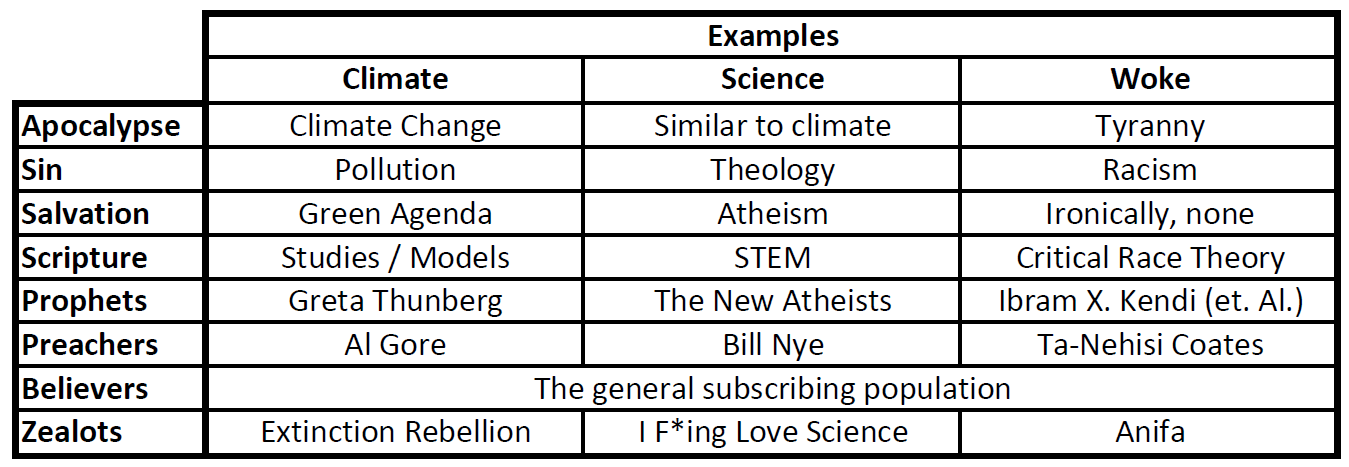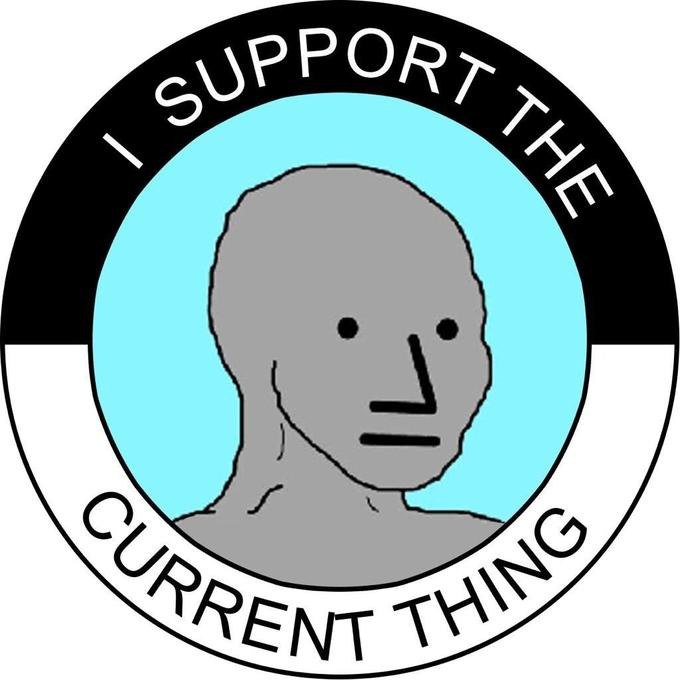Religion as a Psychology
Everyone is Religious
Welcome to Polymathic Being, a place to explore counterintuitive insights across multiple domains. These essays take common topics and investigate them from different perspectives and disciplines to come up with unique insights and solutions.
Today's topic introduces a controversial concept that divorces religion from theology and shows how even the atheistic are vulnerable to a religious psychology.
I grew up in a non-denominational church. Sure it had an affiliation, but it was loose and they were pretty easygoing. I also attended numerous church types from some youth services at a nearby Pentecostal church to a Baptist and another non-denominational in college (even a United Methodist because of the girl I had a crush on in college).
My wife grew up Lutheran (Missouri Synod) and we got married by a Lutheran chaplain in Korea and, after I got out of the Army, we joined a Lutheran church and began to settle in. This lasted about as long as it takes a Polymath to read 2 Timothy 2:15:
“Study to show thyself approved to God, a workman that need not to be ashamed, rightly dividing the word of truth. Earnestly seek to commend yourself to God as a servant who, because of his straightforward dealing with the word of truth, has no reason to feel any shame.”
As I really began to study the Bible I also started to study the other Middle Eastern religions that had an influence on the Bible. Things like the Code of Hammurabi, the influence of the Phoenician alphabet on Hebrew pictographs, (which creates an amazing story about the actual symbolism of the infamous golden calf story), the structure of the Torah mitzvah, chukim, and mishpatim (the ‘laws’ which will be another topic altogether) and then later influence of Osiris and Dionysus mysteries on the New Testament. Needless to say, my study soon broadened out into the plethora of religions and philosophies around the world from Daoism to Stoicism and more.
Eventually, I stepped away from organized religions. I didn’t know enough to be an Atheist, but I knew way too much to be Agnostic (literally without (a) knowledge (gnosis)). I’ll save what I consider myself for another essay but let’s just say, I’d studied the theistic religions across the planet to a pretty deep and broad level.
What I wasn’t prepared for was stepping outside of religion straight into religion. This time it went from theistic religion to atheistic religion. I didn’t catch it at first, but the sound, the tone, the resonance, the phraseology, and the feeling were just as thick as when I was in a Pentecostal church watching people quake and speak in tongues. That’s when I realized the truth:
Religion is a psychology!
Certainly, religion manifests most obviously as a theology because that’s how we’ve managed to explain our existence, our environment, and the chaos, and blessings that emerge from it. But when you become atheistic, do you lose religion? Most would say yes, clearly losing the theism means you’ve doffed all the trappings of religion! But what if religious psychology came first, and those questions, needs, and desires were filled with theism?
Because I look around and I see incredibly religious atheists. They just replaced theistic belief with something else to fill the gaping hole in their soul. Are they wrong to do this? I’d say absolutely not! They just have to realize what they are doing, where they are finding meaning, and question if it’s really helping.
This gets into my current religious axiom I phrase as a question to myself and others:
Is what you believe, and where you place your faith, enabling you to become a better person and allowing you to add positive energy to the world around you?
If your answer is yes, and your life and behavior bear that out, then I don’t even have to question your religion, theistic or otherwise. At this point, it becomes an intellectual curiosity for me and I’m gladly willing to stop. I don’t need to prove you wrong because I don’t even know what right looks like.
But I do know what wrong looks like. This is where the psychology of religion, theistic or otherwise, takes on negative energy. It’s making you dark, anxious, nasty, and petty. It’s causing people around you to experience negative energy. Dragging down hope, excitement, and pleasure. It lacks grace and forgiveness. It’s nihilistic and anti-human. It inflames the soul. It doesn’t build; it deconstructs.
We’ve seen this in churches like the Westboro Baptist church with their infamous protesting of Soldiers’ funerals because of anti-gay sentiment. We see this in Islamic extremists strapping suicide bombing vests and taking a one-way trip to a café. We see this in atheistic organizations and religions around the world.
So how do we identify an atheistic religion? Fundamentally, they look a lot like the theistic ones when you realize what to look for. This list is a good start and most of the time you see 6 or more.
An Apocalypse
Original sin, or a ‘fall’ of humankind
Salvation (Repentance, Forgiveness)
Scriptures
Prophets
Preachers
Believers
Zealots
These sound a lot like the theistic ones so how do they pan out for the atheistic? I propose the following examples. These aren’t meant to be all-inclusive, exclusive, or non-debatable. They are just here to demonstrate how they line up.
I also am not the only one who is saying this as John McWhorter has pointed out in his recent book Woke Racism: How a New Religion Has Betrayed Black America. This is just one example of many that are beginning to emerge in our general consciousness.
The analogies continue along so many topics. Such as those people who turned politics into their religion, where the president was akin to the pope, and lost their minds in 2016 when the US elected an ‘antichrist’ as president. Others align themselves with a plethora of others causes, with varying degrees of zealotry notable in #hashtag activism with the epitome of “I support the current thing” NPC memes and seeing the meme become reality!
With zealotry also comes the clear manifestation of purity. We’ve all seen it in conversations, in signaling, and in social media. And with purity, you also get apostasy and excommunication. What is ‘cancel culture’ but the atheistic manifestation of the excommunication present in the Catholic Church or the Islamic fatwas for blasphemy?
Now you might be saying, religious people participate in these atheistic religions as well! And that is certainly true. I’ve never met a theistic religious person who really followed the first of the ten commandments:
“Thou shall have no other gods before me” - Exodus 20:3
There’s probably a reason why that’s the first commandment in the Judeo-Christian structure. It wouldn’t need to be there if we were naturally monotheistic. Nothing stops the theistically religious from having one-to-many atheistic religions as well. It just depends on how much of a hole in meaning they are trying to fill.
Shifting back to the premise that religion is a psychology. If we can accept that this is true, that there are people who are just as behaviorally aligned to climate alarmism as a Baptist is to the end-of-days in Revelation, then we can begin to see how it permeates and will continue to permeate life.
So what are we to do? Fundamentally, I think the simple answer is to admit, accept, and stop trying to pretend this isn’t what we are doing! There is something fundamentally human in trying to find meaning, solace, acceptance, and tribe. Theistic religion has answered this need for thousands of years. Atheistic ones are trying to do the same thing.
Looking at the negative implications. I find a lot of atheistic religions typically turn toward dark behaviors. Wokism, for example, doesn’t have salvation, forgiveness, or grace. It has original sin and the only remedy is constant repentance and self-flagellation. You can’t be forgiven. Climate alarmism has slightly different negative implications. There is a repentance and a salvation story, but it’s oddly anti-humanist, anti-progress. Neither of these two religions has heaven, just avoidance of hell. They aren’t uplifting; they are demoralizing. They rarely add positive energy to the world.
Stripping away theistic religion, as imperfect as it was, and replacing it with atheistic religions, without the aspiration, grace, and forgiveness of many of our main religions is probably one of the larger causes for the dramatic rise of anxiety, depression, and reduced mental health in the Millennial and Gen Z populations. It also explains the rise of secular extremism from Antifa to MAGA as people gravitate to something, anything to help fill the gap.
Once we admit, accept, and stop trying to pretend we aren’t religious, we can make intentional decisions on how and with what we fill that religious need. I’m not sure how much it will end up improving the world around us, but I can say that for me, it has made me more cognizant and able to avoid losing myself in the plethora of religions. It has allowed me to apply the same degree of critical thinking, analysis, and study to atheistic religions that I did in my theistic religious study. Fundamentally, the knowledge helps me avoid extremism on all sides and it helps me take key elements from theism, such as grace and forgiveness, and extend those to others.
So what is (are) your religion(s)? How do they affect your life? Are they allowing you to become a better person? Are they allowing you to add positive energy to the world around you?
More on the topic of religion:
Enjoyed this post? Hit the ❤️ button above or below because it helps more people discover Substacks like this one and that’s a great thing. Also please share here or in your network to help us grow.
Polymathic Being is a reader-supported publication. To receive new posts and support my work, consider becoming a free or paid subscriber.











I think you are spot on. And just like religions have a fair number of lukewarm believers who show up for services but don’t actually do all the things, you’ve got your climate changers who still run the a/c and drive SUVs; the wokesters who move to the lily-white burbs “for the good schools”.
I have an acquaintance who is very religious about climate and wokeness. And for years my husband and I have chuckled that 300 years ago she would have been front and center with the torch and pitchfork demanding that the witches be burnt. There’s a certain personally type that just always wants to take things a little too far.
The way I would put it is that there are patterns in behaving / believing / belonging that human beings repeatedly and persistently fall into.
One thing about your 3 examples is that they broadly come from “the left”. On the right, there is actual religion but also MAGA and white supremacism.
The two obvious writers to link this to are: John Gray - esp. Black Mass. For Gray, every modern political movement is really Christian millennialism in disguise. For Tom Holland (not that one) he would describe the current political moment in America as a civil war between 2 inheritors of Christianity. Which is a description I like if only because it offends almost everyone.